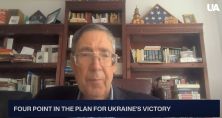Long-range strike permission. Putin’s nuclear gavel waiving. Russian military depots and oil refineries are on fire. Ins and outs of todays situation in an interview with senior lecturer at the Royal Air Force College, former military intelligence officer Frenk Ledwidge at UATV studio.
— American military aid to Ukraine and plans for the next Ramstein—all that is very important and necessary, no doubt about that. But, do you feel this assistance is enough for Ukraine’s victory without long-range strike permission?
— No, of course not, and I don’t think the long-range strike weapons, at the kind of scale that would be envisaged, are either. So if I can deal with those now… the U.S. ATACMS, a particular version of ATACMS, and of course the British Storm Shadow…
The fact is that neither the Americans, the British, nor the French have nearly adequate stocks to damage the Russian war machine to the extent that it would be seriously reduced in capability.
Now, that’s simply a function of 20 years of neglect of allied weapons systems and the displacement activity of Iraq and Afghanistan—totally pointless, silly, and stupid bloody messes that they were. But there we have it.
As for what Ukraine is getting, it’s getting, of course, a significant transfusion of important defensive weapons, not least of course, another Patriot battery—one battery with eight launchers, certainly necessary. There have been losses, and that will replace some of those losses. But no, it isn’t enough. It’s nowhere near enough. If it were to be sufficient, the instructions and orders should have been given, as I’ve argued many times, two years ago for the vast stocks of ground weaponry and, to a lesser extent, aircraft to be released from storage, where they still remain.
What it actually takes to put an end to the Russian military machine is all allies and Ukraine together winning the victory.
— Assuring the victory, is that what you’re saying? Or what do we need to do, Mr. Ledwidge? Instruct us.
— To be candid with you, what we need to do should have been done years ago. And it’s difficult to see now how the situation—particularly with respect to, we’re looking not so much at the battlefield, but rather at least the equally important element of industrial power and industrial strategy.
And the West lacks industrial strategy. That has impacted Ukraine, of course.
The kind of gear that you need is not being made. The instructions have not been given in Germany, Britain, and France to rectify their own stocks, let alone have sufficient to help Ukraine.
Those stocks do exist in the U.S., but the political will evidently doesn’t exist to transfer the thousands of armored vehicles and aircraft—probably dozens of aircraft more practically, but certainly they’re present. They just need the will to refurbish them, and other capabilities from those stocks to release them to Ukraine.
The order isn’t even being given now—it should have been given two years ago. That way, Ukraine wouldn’t need to worry about replacing material losses in battle. But then, of course, there’s a manpower issue, which you’ll be more familiar with than me, to crew those weapons systems. But no, the West has been complacent and continues to be complacent in its defense. The only country that isn’t complacent, as you well know, is Poland.
— Let’s talk about Putin’s nuclear saber-rattling, if you want. His nuclear waving continues, and some say the West should react—like Biden, for example, with fear—just keep the level of Ukrainian civilians dying steady.
You know, we want no escalation. Some say the West should ignore all of Russia’s threats—Satan missiles or whatever they have, six of seven can’t even fly. How should the West respond to these nuclear blackmails or threats, what do you think?
— Well, there’s one decision-making body—not a decision-maker—that counts here, and only one: the Biden administration. The individual, of course, is non-functional, but the administration is functional. It made a decision that there will be no risks taken, let’s say, before the election, and that’s for domestic political reasons.
The decision-maker, partly because the weapons systems that Ukraine requires understandably contain significant American components, and of course some of them are American-made themselves. But Starmer and Macron are irrelevant—it’s the Biden administration. The Biden administration is faced with a very tough election, and that’s what drives this.
Now, moving down the scale of engagement into strategic military matters, there’s considerable doubt as to whether Putin would use nuclear weapons. But that’s not really what’s coded into this. What’s coded are other options, like, for example, a cyber-attack on Baltimore, Denver, Colorado, or Liverpool, for that matter. But probably Western Europe is out of this. It would damage Biden or Harris’s prospects, no doubt about it. The escalatory ladder to nuclear is very long, but I think the Americans don’t want to get on that ladder.
— But Russian military depots and oil refineries are constantly on fire, and more to come. So, of course, Russia is no more. But Russia continues to push in the Donetsk region.
Anyway, Putin recently said that all the goals of his criminal adventure in Ukraine, that he calls a war, will be achieved by the anniversary—which is February 2025. Things like biting off more of Donetsk region today, to trade it back for Kyiv later. Why?
— Well, conceivably, as far as Putin has set any identifiable objectives in the war, as you hint, it’s Luhansk and Donetsk. And I seriously doubt whether Russia will be in any position to call it a day by February next year, on current pressure. But nonetheless, that’s their objective.
Read also: Zelenskyy’s visit to the US. Ins and outs. Interview with Cormac Smith









